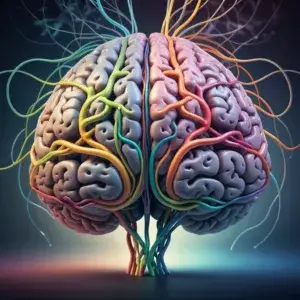Table of Contents
Improve Your Focus and Concentration
I often hear from people who want to enhance their focus and concentration. If you’ve experienced your mind wandering in the middle of a task or struggled to maintain attention during long projects, you’re not alone. Improving focus is not just about willpower; it involves understanding the intricate connection between your mind and body and the environment that supports them.
One key aspect is the integration of physical health with cognitive performance. Regular exercise can sharpen your mental faculties, elevate your mood, and, in turn, improve concentration. Sleep, too, is paramount for cognitive functions. Insufficient sleep can scatter your focus, making tasks seem harder than they actually are. Remember, to harness your brain’s full potential, treating your body right is the foundation.
Moreover, it isn’t just your physical space that needs tailoring. Your mental space requires conditioning too. Developing a routine helps signal your brain that it’s time to focus. Consistent cues, such as starting with a clear plan for the day or a pre-work ritual, can train your mind to transition into a state of heightened focus. In time, these routines become second nature.
Another area to improve your focus and concentration which is often overlooked is the environment you choose for work or study. External factors like noise, lighting, and ergonomics play a significant role. A well-lit and organized space can minimize distractions and cue your mind to settle into a state of deeper concentration. Personalize your space to what feels conducive to concentration for you; this may involve some trial and error to get it just right.
Now that we’ve covered the basics of how to prime your internal and external environment for better focus, we should consider another vital element: what you fuel your body with. Good nutrition can have a positive impact on your concentration abilities, something that’s easy to overlook in a busy lifestyle. Next, I’ll discuss how diet and hydration are not just necessities for physical health but crucial for mental performance too.
Nutrition and Hydration: Fuelling Your Focus
I understand the temptation to reach for a cup of coffee when your mind starts to wander, but let’s talk about how nutrition and hydration genuinely fuel your focus. Your brain is an energy-intensive organ, using about 20% of your body’s calories, so what you consume matters immensely for your concentration.
Eating the right ‘brain foods’ can be a game-changer. Foods like fatty fish rich in omega-3s, blueberries boasting antioxidants, or nuts and seeds with their healthy fats and proteins, have been shown to benefit brain health. Including them in your diet could mean the difference between a sharp or sluggish mind.
Now, hydration might seem like an unrelated topic, but it’s crucial. Your brain is about 75% water, and even mild dehydration can affect cognitive function and focus. So, keep that water bottle close and ensure you’re drinking regularly throughout the day.
Meal timing and balance impact your brain’s fuelling process too. Consuming a mix of proteins, fats, and complex carbohydrates helps provide steady energy. Planning your meals to avoid heavy, high-sugar, or high-fat foods can prevent energy crashes that destroy your focus.
You should also be aware of common focus detractors. Excessive sugar, processed foods, and even that beloved caffeine, in large amounts, can cause spikes and crashes in energy levels. Recognize your personal triggers and limit or avoid them to maintain a more consistent level of concentration.
Technological Tools and Techniques: Harnessing Digital Aids
In today’s digital landscape, the right technological tools can be invaluable allies in improving focus and concentration. From apps that limit social media time to software that enhances workflow, it’s possible to customize a digital environment geared towards productivity.
The challenge isn’t the lack of resources; it’s filtering through to find the most effective ones for your needs. Experiment with concentration apps like Focus@Will, which provides music scientifically optimized to increase attention span, or Cold Turkey Blocker, which can block distracting websites during work hours.
Setting limits on technology use may sound counterintuitive when discussing digital aids, but establishing tech-free times can significantly enhance focus. Commit to turning off notifications or setting your phone to ‘Do Not Disturb’ during critical work or study sessions.
Your workspace can also benefit from a tech makeover. Consider dual monitors for more screen real estate or use desktop organizers that help keep your digital files in check. Physical and digital decluttering often go hand-in-hand with mental clarity.
Lastly, use technology to track and understand your concentration patterns. Apps like RescueTime can provide insights into your most productive times, offering data to help you create a schedule that aligns with your peak mental performance.
Making Rest Part of Your Routine: Sleep and Breaks
I cannot overstate the influence a good night’s sleep has on your overall ability to focus. Compromising on sleep is like trying to drive your car with the handbrake on; it’s counterproductive. Quality sleep primes your brain for peak performance, enhancing memory, attention, and cognitive function.
Now, establishing a sleep schedule that aligns with your natural rhythms isn’t about strict bedtimes; it’s about consistency. Your goal should be to wake up refreshed, ready to tackle the day’s tasks with sharp focus. Find the sleep pattern that works for you and stick to it – your concentration will thank you.
Let’s talk about breaks. Yes, they’re as important as the work itself. There’s power in stepping back periodically. Strategic breaks – a walk, a meditative moment, or just time away from the screen – can significantly recharge your focus. The Pomodoro Technique, where you work for 25 minutes and break for 5, exemplifies this.
And what about naps? When used wisely, a brief nap can be an incredible reset button. It’s not about long sleep spells during the day but rather a short snooze to reboot your brain. Even a 20-minute nap can improve alertness without the grogginess that longer naps might cause.
Resources
- “Train Your Brain: 10 Ways to Improve Concentration”
Harvard Health Blog
Link - “How to Improve Concentration: 12 Science-Backed Tips”
Healthline
Link - “Focus and Concentration: Enhancing Mental Clarity”
Psychology Today
Link - “10 Simple Concentration Exercises”
Forbes
Link - “Effective Strategies for Improving Focus at Work”
Inc.com
Link







